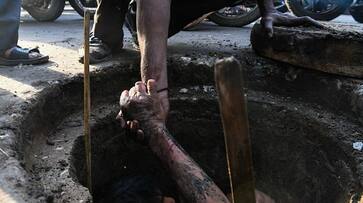The bill proposes to make the law banning manual scavenging more stringent by increasing the imprisonment term and the fine amount, the officials said
New Delhi: The government plans to make the law banning manual scavenging more stringent by introducing a bill in the Monsoon Session of Parliament, which is scheduled to begin from Monday.
The Prohibition of Employment as Manual Scavengers and their Rehabilitation (Amendment) Bill, 2020, also proposes to completely mechanise sewer cleaning and provide better protection at work and compensation in case of accidents, officials said.
Currently, engaging any person for hazardous cleaning of sewers and septic tanks by any person or agency is punishable with imprisonment of up to five years or a fine up of to Rs 5 lakh or both.
The bill proposes to make the law banning manual scavenging more stringent by increasing the imprisonment term and the fine amount, the officials said.
The bill is among the 23 bills to be tabled in Parliament during the Monsoon Session.
The amendment bill comes amid increasing number of deaths during cleaning and maintenance of sewers in the country.
The Prohibition of Employment as Manual Scavengers and their Rehabilitation Act, 2013 prohibits construction or maintenance of insanitary latrines, and employment of any person for manual scavenging or hazardous cleaning of sewers and septic tanks.
The bill comes under the Social Justice and Empowerment Ministry's National Action Plan which aims at complete elimination of hazardous cleaning of sewers and septic tanks, a more serious, stringent and focused strategy framework.
The plan aims to modernise existing sewage system and coverage of non-sewered areas; setting up of faecal sludge and septage management system for mechanised cleaning of septic tanks, transportation and treatment of faecal sludge; equipping the municipalities, and setting up of Sanitation Response Units with help lines, according to a document by the Ministry of Social Justice and Empowerment.
Last Updated Sep 12, 2020, 3:07 PM IST









![Salman Khan sets stage on fire for Anant Ambani, Radhika Merchant pre-wedding festivities [WATCH] ATG](https://static-gi.asianetnews.com/images/01hr1hh8y86gvb4kbqgnyhc0w0/whatsapp-image-2024-03-03-at-12-24-37-pm_100x60xt.jpg)
![Pregnant Deepika Padukone dances with Ranveer Singh at Anant Ambani, Radhika Merchant pre-wedding bash [WATCH] ATG](https://static-gi.asianetnews.com/images/01hr1ffyd3nzqzgm6ba0k87vr8/whatsapp-image-2024-03-03-at-11-45-35-am_100x60xt.jpg)


